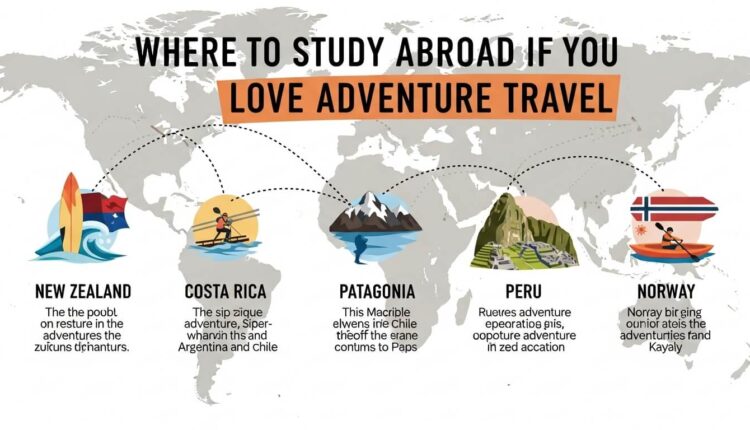Where to Study Abroad If You Love Adventure Travel
Study Abroad If You Love Adventure Travel. Thousands of Students Are Already Trading Lecture Halls for Mountaintops — Are You? Imagine standing on a suspension bridge in New Zealand, the wind rushing past your face, the valley below stretching for miles. You’re not just there as a tourist — you’re there as a student. In the morning, you attended a lecture on environmental science. By afternoon, you’re hiking with classmates, tracing the ecological impact of the very landscapes you read about in your textbooks.
This is the new face of studying abroad — one where adventure and academics blend seamlessly. And thousands of students across the globe are already stepping into it. According to the Institute of International Education (IIE), more than 347,000 U.S. students studied abroad in the 2018–2019 academic year. While traditional motivations like earning credits and cultural exchange still play a role, a growing number of students are seeking adventure-filled destinations that promise not only a diploma but also memories that last a lifetime.
But here’s the pain point:
Most students still believe studying abroad is only about lectures, libraries, and exams.
This outdated mindset means many adventurous, thrill-seeking students miss out on opportunities that could completely reshape their personal growth. What if studying abroad could give you more than a classroom? What if it could give you mountains to climb, oceans to surf, and trails to hike — all while pursuing your degree?
Studying Abroad Isn’t Just for Bookworms…
This is where the negation prompt comes in: Studying abroad isn’t just for bookworms. It’s for the explorers, the risk-takers, and the students who believe learning should happen both inside and outside the classroom.
Adventure travel and study abroad together offer something extraordinary: the chance to study a subject in its natural setting. Think of:
- Learning marine biology while diving along Australia’s Great Barrier Reef.
- Exploring climate change research in Iceland by walking across its glaciers.
- Studying anthropology in South Africa while experiencing its cultural and ecological diversity firsthand.
In other words, the world itself becomes your classroom.
Why This Matters Now
The timing couldn’t be more important. According to the Adventure Travel Trade Association (ATTA), the adventure travel market has been growing by 21% annually since 2012. This boom shows that young people increasingly value experience over possessions — a trait especially true for Gen Z and Millennials. Combining this trend with the academic opportunities of studying abroad creates a powerful match.
Students today aren’t just looking for degrees; they’re looking for stories worth telling, Instagram-worthy landscapes, and transformative experiences that help them grow as global citizens.
So here’s the real question for adventurous students:
👉 Will you settle for lecture halls and dorm rooms, or will you choose to study abroad in destinations where every day feels like an adventure?
Why Adventure Travel & Study Abroad Belong Together
The Rise of Experience-Based Education
For years, studying abroad was viewed as a way to improve language skills, gain global exposure, or enhance a résumé. Those reasons are still true, but the modern study abroad experience is shifting toward something deeper: adventure-driven, experiential learning.
Gen Z, often called the “experience generation,” places higher value on travel, exploration, and self-discovery than material possessions. According to a report by Eventbrite, 78% of Millennials and Gen Z would rather spend money on an experience than a physical item. Pair that mindset with the opportunities of international education, and you get a trend that blends academics with thrill-seeking exploration.
Adventure travel is no longer just a vacation—it’s a way to learn, adapt, and grow.
The Numbers Behind the Trend
- Adventure Travel Market Growth: The Adventure Travel Trade Association (ATTA) reports that the adventure travel industry has been growing by 21% annually since 2012. That means millions of young travelers are actively seeking destinations where excitement and learning go hand in hand.
- Student Motivations: The Institute of International Education (IIE) notes that 90% of students who study abroad report increased confidence, independence, and adaptability. These are the very same traits cultivated by adventure activities like hiking, diving, or mountaineering.
- Career Benefits: A WorldStrides study found that 84% of students felt study abroad improved their ability to handle unexpected situations—a skill employers deeply value in today’s fast-changing world.
In short: adventurous study abroad programs don’t just satisfy wanderlust; they build the resilience, creativity, and global awareness that employers want.
Adventure + Academics = The Perfect Match
When you combine study abroad with adventure, you get a transformational learning model:
- Personal Growth
Adventure activities often require stepping outside your comfort zone. Cliff diving in Thailand or glacier hiking in Iceland forces you to push boundaries. That same confidence spills over into your academic and professional life. - Adaptability and Problem-Solving
Adventure often comes with unpredictability—weather shifts, cultural differences, unexpected challenges. Learning to adapt during these moments mirrors the adaptability required in today’s global workforce. - Cultural Immersion
Hiking through Costa Rica’s rainforests or joining a local surfing community in Australia isn’t just fun; it’s a gateway to deeper cultural understanding. You don’t just learn about a country—you live it. - Learning in Context
Imagine studying environmental science while surrounded by biodiversity in Costa Rica, or sustainable energy while examining geothermal sites in Iceland. These experiences move education from theoretical to practical, embedding knowledge in unforgettable real-world contexts.
The Student Perspective
For adventurous students, this combination can be life-changing. A student who once felt shy may gain confidence scaling mountains in South Africa. Another who struggled to find motivation may discover new passions while scuba diving on Australia’s coral reefs.
This isn’t just about adrenaline; it’s about creating well-rounded, global citizens ready for the challenges of the future.
So while some students may only see study abroad as time in a foreign library, adventurous students know the truth:
👉 The world is your classroom, and adventure is the teacher.
Top Adventure Study Abroad Destinations
Adventure looks different depending on where you go. For some students, it’s bungee jumping off a 134-meter bridge. For others, it’s trekking through rainforests or diving deep into coral reefs. What makes studying abroad so powerful is that you don’t have to choose between adventure and academics — in the right country, you get both.
Below are some of the top adventure study abroad destinations where classrooms meet mountains, oceans, and trails.
🇳🇿 New Zealand – The World’s Outdoor Classroom
New Zealand has earned its reputation as the adventure capital of the world. With its breathtaking landscapes — from snow-capped mountains to lush valleys and wild coastlines — it’s a dream for thrill-seekers.
- Adventure Opportunities:
- Bungee jumping (home of the world’s first commercial bungee jump).
- Hiking and trekking the famous Milford Track and Tongariro Alpine Crossing.
- Skiing in Queenstown, known as the adventure hub.
- Academic Strengths:
Universities like the University of Otago and University of Auckland excel in environmental science, geology, and outdoor recreation programs. Studying here means conducting research in one of the world’s most geologically active regions.
📌 Why Choose It? If you’re looking for a balance between serious study and adrenaline-filled weekends, New Zealand is unbeatable.
🇨🇷 Costa Rica – Rainforests, Volcanoes, and Biodiversity
Costa Rica is often called “nature’s classroom”, and for good reason. With over 25% of its land protected as national parks and reserves, it’s a paradise for students interested in environmental science and sustainable development.
- Adventure Opportunities:
- Trekking volcanoes like Arenal.
- Zip-lining through rainforests.
- Surfing on the Pacific or Caribbean coasts.
- Wildlife watching — from sloths to toucans.
- Academic Strengths:
Costa Rica is a leader in sustainability, conservation biology, and eco-tourism programs. Students can study ecosystems in real time, surrounded by incredible biodiversity.
📌 Why Choose It? If your dream is to combine ecological research with rainforest adventures, Costa Rica is your destination.
🇿🇦 South Africa – A Blend of History and Wilderness
South Africa is a country that offers cultural richness and adventure in equal measure. From urban energy in Cape Town to the natural wonders of Kruger National Park, it’s a destination that challenges and inspires.
- Adventure Opportunities:
- Safari tours to see lions, elephants, and rhinos.
- Diving with great white sharks (for the bravest!).
- Hiking Table Mountain and Drakensberg Mountains.
- Academic Strengths:
The University of Cape Town and Stellenbosch University are renowned for programs in history, political science, and environmental studies. Studying here allows you to explore global issues while enjoying unmatched outdoor adventures.
📌 Why Choose It? South Africa is perfect for students who want to blend academic depth with once-in-a-lifetime wilderness experiences.
🇮🇸 Iceland & 🇳🇴 Norway – Glaciers, Fjords, and the Northern Lights
For students drawn to cool climates and dramatic landscapes, Iceland and Norway offer unmatched experiences. These destinations are perfect for those interested in climate science and sustainability.
- Adventure Opportunities:
- Hiking glaciers and volcanoes.
- Kayaking through fjords.
- Viewing the Northern Lights.
- Ice climbing and skiing.
- Academic Strengths:
Both countries are leaders in renewable energy, climate studies, and environmental engineering. Iceland is particularly known for geothermal energy research, while Norway excels in marine biology and sustainability studies.
📌 Why Choose It? If you’re passionate about tackling climate change while living in one of the world’s most beautiful natural environments, this is your adventure classroom.
🇦🇺 Australia & 🇹🇭 Thailand – Surfing Meets Cultural Exploration
Australia and Thailand might seem worlds apart, but they share a common appeal: adventure blended with vibrant culture.
- Australia
- Adventure Opportunities: Surfing at Bondi Beach, scuba diving on the Great Barrier Reef, exploring the Outback.
- Academic Strengths: Strong programs in marine biology, environmental science, and international business.
- Thailand
- Adventure Opportunities: Scuba diving in Koh Tao, rock climbing in Krabi, exploring temples and bustling markets.
- Academic Strengths: Affordable programs in hospitality, cultural studies, and international relations.
📌 Why Choose Them? Australia is ideal for those who want high-quality education alongside beach and ocean adventures. Thailand is perfect for budget-conscious students who want rich culture plus adrenaline activities.
Wrapping Up the Destinations
Each of these study-abroad hotspots offers more than just academics — they offer transformational experiences. Whether it’s the glaciers of Iceland, the safaris of South Africa, or the beaches of Australia, these countries prove that adventure and learning go hand in hand.
👉 The next step is figuring out how to choose the right destination for your academic and adventurous goals.
How to Choose the Right Adventure Study Destination
Choosing a study abroad destination isn’t as simple as picking the most adventurous place on the map. Sure, the thought of surfing in Australia or hiking in Norway sounds thrilling — but the wrong choice can leave you overwhelmed, financially stressed, or academically unfulfilled.
That’s why it’s crucial to balance adventure opportunities with practical considerations. Here’s a guide to making the best decision.
1. Match Adventure Interests with Academic Goals
Every student has different passions, and the right destination should reflect both.
- Love the ocean? → Consider Australia or Costa Rica, where marine biology and environmental studies connect directly with coastal adventures.
- Interested in sustainability? → Look at Iceland or Norway, leaders in renewable energy and environmental science.
- Cultural explorers? → South Africa and Thailand offer unique blends of history, culture, and outdoor thrills.
- Outdoor adrenaline junkies? → New Zealand’s world-famous adventure sports make it the ultimate fit.
📌 Tip: Always research the top academic programs in your field within each destination. A country may offer adventure but not have strong universities in your subject area.
2. Consider Climate and Geography
Adventure is often shaped by the environment. Ask yourself:
- Do you prefer warm, tropical settings (like Thailand or Costa Rica)?
- Or do icy landscapes and cooler weather (like Iceland or Norway) excite you?
Your tolerance for weather and terrain will affect how much you actually enjoy your adventures. Remember, you’ll be there for months — not just a quick vacation.
3. Budget and Cost of Living
Adventure comes at a price, and so does studying abroad. Countries like Norway and Iceland are breathtaking but also among the most expensive in the world. On the other hand, Thailand and South Africa offer affordable living without sacrificing adventure.
💰 Key costs to factor in:
- Tuition fees (varies by university and program).
- Housing and meals.
- Transportation (domestic and international).
- Adventure activities (some are cheap, others — like diving or skiing — can be pricey).
📌 Tip: Search for scholarships for adventurous study abroad programs. Many universities and NGOs offer funding for students pursuing environmental or cultural studies in unique destinations.
4. Language and Cultural Comfort
While adventure is about stepping out of your comfort zone, don’t overlook language barriers.
- English-speaking countries like New Zealand and Australia make daily life easier.
- Countries like Thailand or Costa Rica may require some language learning, which can be part of the adventure itself.
Also, consider cultural fit. Ask:
- Will I feel safe and welcome here?
- Is the lifestyle relaxed or high-paced?
- Do I want to immerse myself in a culture that’s vastly different from my own, or something more familiar?
5. Visa Rules and Safety Considerations
Each country has different visa requirements for international students. Some require proof of financial stability, while others may have strict medical insurance rules.
Safety is another critical factor. Adventure activities carry inherent risks, but you also want to study in a country that’s politically stable and secure for international students. Check advisories from sources like the U.S. Department of State or your own country’s foreign affairs office.
Quick Comparison Snapshot
| Destination | Adventure Style | Best For | Cost of Living | Language Barrier |
| New Zealand | Bungee jumping, trekking | Outdoor adrenaline lovers | High | Low |
| Costa Rica | Rainforests, volcanoes | Environmental & biodiversity | Moderate | Medium |
| South Africa | Safaris, hiking, diving | History + wilderness explorers | Moderate | Medium |
| Iceland/Norway | Glaciers, fjords, skiing | Climate science, sustainability | Very High | Medium |
| Australia | Surfing, scuba, Outback | Ocean & marine studies | High | Low |
| Thailand | Diving, climbing, culture | Budget adventurers, culture fans | Low | Medium |
Final Advice for Choosing
When choosing your adventure study abroad destination, always keep three guiding questions in mind:
- Will this country support my academic goals?
- Can I afford to live and thrive here for the duration of my studies?
- Does this destination excite me enough to step out of my comfort zone daily?
👉 If the answer is yes to all three, you’ve found your match.
Conclusion + Call to Adventure (CTA)
Studying abroad is more than just a degree—it’s a life-changing adventure. Yes, the emotional and social challenges are real. From culture shock and loneliness to financial pressure and language barriers, international students face hurdles that test their resilience. But those same hurdles often become the stepping stones to growth, adaptability, and global citizenship.
📊 Research consistently shows that students who overcome these challenges gain stronger problem-solving skills, cross-cultural awareness, and global networks that set them apart in today’s competitive job market.
🌍 The truth? No guidebook, blog post, or orientation session can fully prepare you for the emotional rollercoaster of living and learning in a new country. But you don’t have to face it alone. By seeking support, connecting with peers, and embracing cultural differences, you can turn uncertainty into opportunity.
👉 Your next step:
Don’t just dream about studying abroad—start building your roadmap today. Explore scholarships, research universities, prepare your visa documents, and connect with communities of students already living your dream.
✨ Remember: The challenges may feel overwhelming now, but every international student who came before you once stood exactly where you are. They took the leap—and so can you.
- “👉 Ready to take the first step? Explore our [Scholarships Guide] and start planning your study abroad journey today.”
- “🌍 Don’t let fear hold you back—discover our [Affordable Universities List] for international students.”


